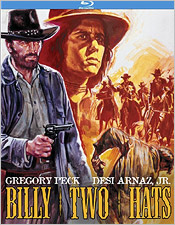Billy Two Hats (Blu-ray Review)

Director
Ted KotcheffRelease Date(s)
1974 (September 15, 2015)Studio(s)
United Artists (Kino Lorber Studio Classics)- Film/Program Grade: A
- Video Grade: B
- Audio Grade: B+
- Extras Grade: C
Review
For an era that was supposed to represent a dead zone for the American Western, the 1970s sure gave birth to a lot of great ones. The conventional wisdom is that Sergio Leone’s spaghetti Westerns and Sam Peckinpah’s The Wild Bunch represented a kind of last gasp for the genre in the 1960s, until its brief popular revival in the 1990s in the wake of Dances with Wolves and Unforgiven. Yet while the Western may have more or less fallen out of favor as a popular form, writers and directors continued to use its structures to great effect in the 1970s, commenting on Vietnam, the civil rights movement, and post-Watergate malaise in a series of extraordinarily ambitious works. Arthur Penn (Little Big Man, The Missouri Breaks), Sidney Poitier (Buck and the Preacher), Clint Eastwood (High Plains Drifter, Outlaw Josey Wales), and Robert Altman (McCabe and Mrs. Miller, Buffalo Bill and the Indians) are just some of the auteurs who did great work in the genre during this period, and of course stalwarts like Peckinpah, Burt Kennedy, and Don Siegel continued to do what they always had.
Perhaps the greatest, and certainly the most unsung, figure in 1970s Westerns was Scottish screenwriter Alan Sharp, a remarkable talent who scripted several of the greatest American films ever made. A novelist by trade, in the early 1970s Sharp began cranking out a series of smart, tough studies in male existential angst – films that both commented on and were emblematic of their weary, disillusioned times. Sharp is perhaps best remembered for his script for Arthur Penn’s acid-tongued film noir Night Moves, and rightfully so; but he also applied that same penchant for razor-sharp dialogue and moral ambiguity to a trio of masterful Westerns made within three years of each other. The Hired Hand (directed by Peter Fonda), Ulzana’s Raid (Robert Aldrich), and Billy Two Hats (Ted Kotcheff) are all essential viewing for Western enthusiasts, and all great places to begin thinking about what made Sharp special.
Billy Two Hats is the least well known of the group, a situation that will hopefully be rectified now that it is available on Blu-ray. Desi Arnaz, Jr. plays the title character, an Indian who teams up with an Irish thief (Gregory Peck) and then goes on the run with his partner after a heist that puts them in the sights of ruthless marshal Jack Warden. The film is essentially a character driven chase in which Warden tracks the criminal pair as they try to make their way to Mexico; along the way there are some beautifully staged shoot-outs, but the real strength of the movie comes from the meditations on race, sex, and class that the premise facilitates. Sharp’s script is the best kind of American genre picture, a stripped-down, lean and mean premise that yields surprisingly complex and moving twists and turns; like all of his films, it’s best viewed with as little knowledge of the plot as possible going in, so as to fully appreciate its idiosyncrasies. Kino Lorber’s new Blu-ray is a fine way to discover the movie, with a crisp, clear transfer marred only by a handful of warped, jittery shots. These are few and far between, and the color, contrast, and tonal range of Brian West’s atmospheric cinematography are all well preserved. (Shot on location in Israel, this “kosher Western” has a unique look all its own.) The 2.0 sound mix is strong as well, with a perfect balance between dialogue, music and effects – this one of those rare Blu-rays where one never needs to ride the volume. The only extras on the disc are an eleven-minute interview with Kotcheff and a trio of Gregory Peck theatrical trailers, including one for Billy Two Hats.
- Jim Hemphill

